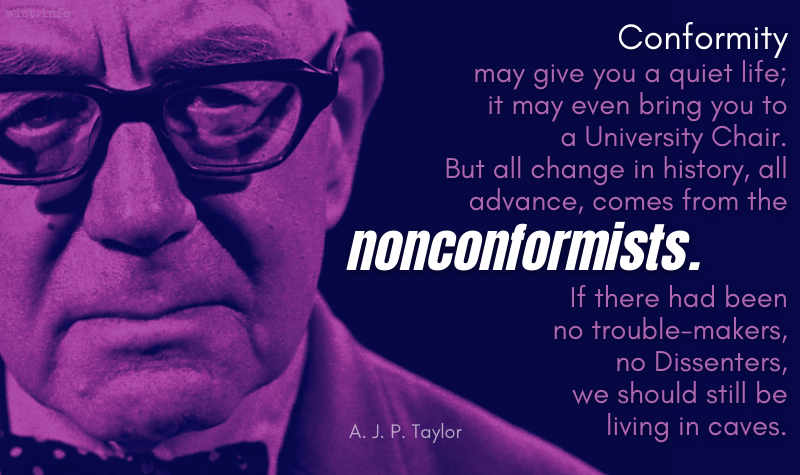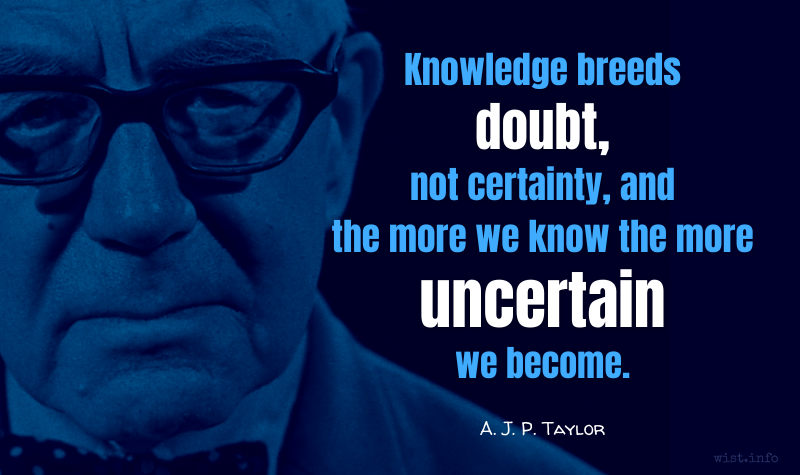In my opinion, most of the great men of the past were only there for the beer — the wealth, prestige and grandeur that went with the power.
A. J. P. Taylor (1906-1990) British historian, journalist, broadcaster [Alan John Percivale Taylor]
“Fiction in History,” Times Literary Supplement (23 Mar 1973)
Reprinted in his Essays in English History (1976).
Quotations by:
Taylor, A. J. P.
He [Napoleon III] was what I often think is a dangerous thing for a statesman to be — a student of history, and like most of those who study history, he learned from the mistakes of the past how to make new ones.
A. J. P. Taylor (1906-1990) British historian, journalist, broadcaster [Alan John Percivale Taylor]
“Mistaken Lessons from the Past,” The Listener (6 Jun 1963)
(Source)
Men write history for the same reason they write poetry, study the properties of numbers, or play football — for the joy of creation; men read history for the same reason they listen to music or watch cricket — for the joy of appreciation.
A. J. P. Taylor (1906-1990) British historian, journalist, broadcaster [Alan John Percivale Taylor]
“The Historian,” Manchester Guardian (5 Aug 1938)
(Source)
The present enables us to understand the past, not the other way round.
A. J. P. Taylor (1906-1990) British historian, journalist, broadcaster [Alan John Percivale Taylor]
“The Radical Tradition: Fox, Paine, and Cobbett,” The Trouble Makers: Dissent over Foreign Policy, 1792-1939 (1969)
(Source)
In my opinion we learn nothing from history except the infinite variety of men’s behaviour. We study it, as we listen to music or read poetry, for pleasure, not for instruction.
A. J. P. Taylor (1906-1990) British historian, journalist, broadcaster [Alan John Percivale Taylor]
“The Radical Tradition: Fox, Paine, and Cobbett,” The Trouble Makers: Dissent over Foreign Policy, 1792–1939 (1969)
(Source)
Conformity may give you a quiet life; it may even bring you to a University Chair. But all change in history, all advance, comes from the nonconformists. If there had been no trouble-makers, no Dissenters, we should still be living in caves.
History is not a catalogue but a version of events … a convincing version of events. If an historian is any good, he is convinced by his own version of events and then tries to put this conviction across.
A. J. P. Taylor (1906-1990) British historian, journalist, broadcaster [Alan John Percivale Taylor]
“The view from Twisden Rd.”, interview by Duncan Fallowell, The Spectator (28 May 1983)
(Source)
“Inevitability” is a magic word with which to mesmerize the unwary. Only death is inevitable. Short of that, nothing is inevitable until it happens, and everything is inevitable once it has happened. The historian deals with past events and therefore to him all history is inevitable. But these past events were once in the future, and then they were not inevitable.
Knowledge breeds doubt, not certainty, and the more we know the more uncertain we become.
A. J. P. Taylor (1906-1990) British historian, journalist, broadcaster [Alan John Percivale Taylor]
“What Else Indeed?” New York Review of Books (5 Aug 1965)
(Source)
Historians can sometimes explain, or at any rate discuss the immediate causes of some great event. Beyond that they can do little more than arrive at the platitude that every generation is, to some extent, responsible for what happened afterwards. In this way, we can finally reach the preposterous conclusion that the ancient Romans were responsible for the First World War, when they failed to civilize the Germans. This is sometimes called learning from history.
A. J. P. Taylor (1906-1990) British historian, journalist, broadcaster [Alan John Percivale Taylor]
“What Else Indeed?” New York Review of Books (5 Aug 1965)
(Source)
They had all been brought up, as we still are, to believe in “the deterrent.” Firm resolve, a readiness to threaten war, would avert war itself. Some Power would always give way. This usually happened, indeed happened so often that the wisdom of the method seemed sure. In 1914 all the Powers, for different reasons, expected the yielding to come from the other side.
A. J. P. Taylor (1906-1990) British historian, journalist, broadcaster [Alan John Percivale Taylor]
“What Else Indeed?” New York Review of Books (5 Aug 1965)
(Source)
The Establishment is enlightened, tolerant, even well-meaning. It has never been exclusive, rather drawing in recruits from outside, as soon as they are ready to conform to its standards and become respectable. There is nothing more agreeable in this life than to make peace with the Establishment — and nothing more corrupting.
A. J. P. Taylor (1906-1990) British historian, journalist, broadcaster [Alan John Percivale Taylor]
“William Cobbett,” The New Statesman (1953-08-29)
(Source)
Taylor is often credited with coining the term "the Establishment" (what Cobbett called "the Thing"). The article, reviewing a biography of Cobbett, was collected in Taylor's Englishmen and Others (1956).
History gets thicker as it approaches recent times: more people, more events, and more books written about them. More evidence is preserved, often, one is tempted to say, too much. Decay and destruction have hardly begun their beneficent work.
A. J. P. Taylor (1906-1990) British historian, journalist, broadcaster [Alan John Percivale Taylor]
English History 1914-1945, “Revised Bibliography” (1965)
(Source)
It is always tempting when you have political discontent in your own country to say it is the fault of some other country and not of your own government.
A. J. P. Taylor (1906-1990) British historian, journalist, broadcaster [Alan John Percivale Taylor]
How Wars Begin (1979)
(Source)
The great armies, accumulated to provide security and preserve the peace, carried the nations to war by their own weight.
A. J. P. Taylor (1906-1990) British historian, journalist, broadcaster [Alan John Percivale Taylor]
The First World War: A Illustrated History, ch. 1 (1963)
(Source)
In retrospect, though many were guilty, none was innocent. The purpose of political activity is to provide peace and prosperity; and in this every statesman failed, for whatever reason. This is a story without heroes, and perhaps even without villains.
A. J. P. Taylor (1906-1990) British historian, journalist, broadcaster [Alan John Percivale Taylor]
The Origins of the Second World War, ch. 1 (1961)
(Source)
No war is inevitable until it breaks out.
A. J. P. Taylor (1906-1990) British historian, journalist, broadcaster [Alan John Percivale Taylor]
The Struggle for Mastery in Europe 1848-1918, ch. 22 (1954)
(Source)
Our task as historians is to make past conflicts live again; not to lament the verdict or to wish for a different one. It bewildered me when my old master A. F. Pribram, a very great historian, said in the nineteen-thirties: “It is still not decided whether the Habsburg monarchy could have found a solution for its national problems.” How can we decide about something that did not happen? Heaven knows, we have difficulty enough in deciding what did happen. Events decided that the Habsburgs had not found a solution for their national problems; that is all we know or need to know. Whenever I read the phrase: “whether so-and-so acted rightly must be left for historians to decide,” I close the book; the writer has moved from history to make-believe.
A. J. P. Taylor (1906-1990) British historian, journalist, broadcaster [Alan John Percivale Taylor]
Trouble Makers: Dissent Over Foreign Policy 1792-1939 (1957)
(Source)



